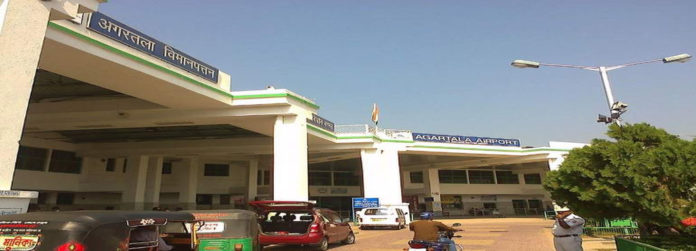The Daily Briefs are a comprehensive update of current affairs for the day. If you’d like to receive updates for current affairs every day, you’ll need to subscribe by entering your email address at the right side of this page. The previous Briefs can be accessed at the archives here.
- Government of Telangana signed an MoU with Singapore-based largest engineering firm Surbana Jurong to lay the roadmap for Genome Valley 2.0. It is a vision to upgrade the current Genome Valley cluster into a world-class knowledge led integrated corridor in a self-sufficient life sciences ecosystem. This initiative will introduce a world class knowledge cluster and lay a master plan to transform the ecosystem into a smart satellite town of Hyderabad. Its expansion will enable more global companies to establish and expand their operations. Valley is Indias first organized pharma-biotech cluster for life sciences R&D activities and largest life sciences destination in Asia, being home to over 200 companies employing 10,000 people. It includes 6 of worlds top 10 R&D companies and three of Indias largest vaccine manufacturers.
- MOVE: Global Mobility Summit:
NITI Aayog announced to organise ‘MOVE: Global Mobility Summit in New Delhi on September 7-8, 2018 in collaboration with various ministries and industry partners. The summit will be inaugurated by the Prime Minister Narendra Modi and will feature global political leaders from the Mobility Space. The Summit will help drive Governments goals for vehicle electrification, renewable energy integration and job growth, thus, speeding up Indias transition to a clean energy economy. MOVE, the first global mobility Summit aims to bring together and engage with key stakeholders within the rapidly transforming global mobility landscape and to evolve a public interest framework for a shared, connected, zero emission agenda for the future. The Summit will constitute three designated components The Conclave, the Expo and the Featured Events. The Summit aims to encourage synergies between indigenous industries such as Automobile Manufacturing, Information Technology, Electronics, and Telecommunications to integrate with global supply chains.
- The Supreme Court on July 3, 2018 refused to put a stay on the Reserve Bank of India (RBI) circular prohibiting banks and financial institutions from dealing in virtual currencies, thus upholding the ban on the virtual currencies such as Bitcoin. With this ruling, all virtual currency transactions through banks would be blocked with effect from July 6, 2018, thus, resulting in a ban. A bench comprising Chief Justice Dipak Misra and Justices A.M. Khanwilkar and D.Y. Chandrachud was hearing a petition filed by the Internet and Mobile Association of India (IAMAI). Counsel appearing for IAMAI, CA Sundaram sought an extension of the three-months time period given to banks to close the accounts dealing with cryptocurrencies, as the move would be beyond repair and would result in a demonetisation-like situation for customers. A committee under the chairmanship of Secretary, Department of Economic Affairs, is deliberating over all issues related to cryptocurrencies to propose specific actions to be taken.
- The Payments Council of India announced the appointment of Vishwas Patel as its new Chairman. Patel is the Director of Infibeam Avenues and succeeds Naveen Surya, who has been elevated to the post of Chairman Emeritus. Payments Council of India is the apex body representing the companies in the payments and settlement system. Vishwas has been associated with the council from its inception in 2013 and was serving as its Co-Chairman. The council has also announced the appointment of Loney Antony, Managing Director, Hitachi Payment Services as its new Co-Chairman. It works with all its members to promote payments industry growth and support goal of Cash to Less Cash Society and Growth of Financial Inclusion which is also vision shared by Government of India and Reserve Bank of India (RBI). PCI works closely with regulators i.e. RBI, Finance Ministry and any similar government, departments, bodies or institutions to make India a less cash society.
- The Khadi and Village Industries Commission (KVIC) its in-housedeveloped,single-umbrella e-marketing system named Khadi Institution Management and Information System (KIMIS) in New Delhi. The system can be accessed from anywhere in the country for the sale and purchase of Khadi and Village Industries products. KVIC Chairman, Vinai Kumar Saxena, while inaugurating the KIMIS, said that KVIC IT team developed software (KIMIS) will give real-time data of sales and will also give the updated status of stocks of khadi bhawans and godowns, allowing better planning and control of inventory of the KVIC. 480 Khadi institutions and showrooms are linked with this billing software and it will be useful in raising demand and supply of goods in high demand. KVIC is a statutory body formed under the Khadi and Village Industries Commission Act, 1956. It is an apex organization under the aegis of Union Ministry of Micro, Small and Medium Enterprises (MSMEs). It plans, promotes, organizes and implements programmes for development of Khadi and village industries in rural areas.
- The Union Cabinet chaired by Prime Minister Narendra Modi on July 4, 2018 approved the proposal submitted by Department of Industrial Policy and Promotion, Ministry of Commerce and Industry regarding accession to the WIPO Copyright Treaty, 1996 and WIPO Performers and Phonograms Treaty, 1996, which extends coverage of copyright to the internet and digital environment. The approval is a step towards the objective laid in the National Intellectual Property Rights (IPR) Policy adopted by the Government on May 12, 2016 which aims to get value for IPRs through commercialization by providing guidance and support to EPR owners about commercial opportunities of e-commerce through Internet and mobile platforms.
- The Union Cabinet chaired by Prime Minister Narendra Modi has given its approval for the continuance of the 8 existing schemes of the Ministry of Home Affairs up to March 2020 for relief and rehabilitation of migrants and repatriates under the Umbrella scheme “Relief and Rehabilitation of Migrants and Repatriates”. The financial implication for this purpose is Rs 3183 crore for the period 2017-18 to 2019-20. The year-wise phasing of the scheme will be Rs 911 crore in 2017-18, Rs 1372 crore in 2018-19 and Rs 900 crore in 2019-2020. The schemes will provide relief and rehabilitation assistance to the refugees, displaced persons, civilian victims of terrorist/communal/LWE violence and cross-border firing and mine/IED blasts on Indian Territory and riot victims of various incidents. The 8 schemes approved for continuance are already in operation, and the benefits under each will be extended to intended beneficiaries in accordance with the approved criterion.
- The Union Cabinet, chaired by the Prime Minister Narendra Modi on July 4, 2018 gave its approval to rename the Agartala Airport in Tripura as Maharaja Bir Bikram Manikya Kishore Airport, Agartala. The decision comes in the wake of the long pending demand of people of Tripura as well as the Tripura Government for paying tribute to Maharaja Bir Bikram Manikya Kishore who ascended the throne of the former Tripura Princely State in 1923, was an enlightened and benevolent ruler. The Agartala Airport was constructed in 1942 on the land donated by Maharaja Bir Bikram Manikya Kishore. Due to the Maharajas initiative, an aerodrome at Agartala was constructed and that has evolved as the second busiest airport in the North East and provides crucial air connectivity to Trip.
- The Union Cabinet chaired by Prime Minister Narendra Modi has approved the creation of one post each of Vice-Chairperson and Member in the National Commission for Safai Karmacharis that is working for the welfare of both Safai Karamcharis and Manual Scavengers. The decision is intended to optimise functioning of the Commission and for fulfilling desired objectives of welfare and development of the target group. The commission is mandated to work towards the elimination of inequalities in status facilities and opportunities for Safai Karamcharis and has an important role to ensure rehabilitation of all the identified manual scavengers on a time-bound basis.
Under Section 31 of the Prohibition of Employment as Manual Scavengers and their Rehabilitation Act 2013, the Commission is mandated to:
- Monitor the implementation of the Act
- Enquire into complaints regarding contravention of provisions of the Act
- Advice Central and State Governments for effective implementation of the Act.
- The Union Cabinet chaired by the Prime Minister Narendra Modi has approved the signing of a Memorandum of Understanding (MoU) between India and the United Kingdom regarding cooperation between the two nations in the sphere of Law & Justice and to set up a Joint Consultative Committee. The MoU takes care of concerns and requirements in the field of exchange of experience by legal professionals, government functionaries and their training and effective legal aid mechanism for resolution of disputes before various courts and tribunals.
- The Union Cabinet chaired by the Prime Minister Narendra Modi has approved the extension of the scheme of recapitalization of Regional Rural Banks (RRBs) for the next three years up to 2019-20. The move will enable the RRBs to maintain the minimum prescribed capital to Risk Weighted Assets Ratio (CRAR) of 9 per cent. A strong capital structure and minimum required level of CRAR will ensure the financial stability of RRBs, which will enable them to play a greater role in financial inclusion and meeting the credit requirements of rural areas. The scheme of Recapitalization of RRBs was started in FY 2010-11 and was extended twice in the year 2012-13 and 2015-16. The last extension was up to March 31, 2017. The identification of RRBs requiring recapitalization and the amount of capital to be provided will be decided in consultation with NABARD. The RRBs were set up with the objective to provide credit and other facilities, especially to the small and marginal farmers, agricultural labourers, artisans and small entrepreneurs in rural areas for development of agriculture, trade, commerce, industry and other productive activities. RRBs are jointly owned by Government of India, the concerned State Government and Sponsor Banks with the issued capital shared in the proportion of 50%, 15% and 35% respectively.
- The Union Cabinet chaired by the Prime Minister Narendra Modi has given its ex-post facto approval for the Memorandum of Understanding (MoU) signed in 2014 and approval for renewal of MoU between the Institute of Chartered Accountants of India (ICAI) and Saudi Organisation for Certified Public Accountants (SOCPA) in Saudi Arabia.The MoU aims to promote mutual co-operation framework in the areas of Corporate Governance, Technical Research & Advice, Quality Assurance, Forensic Accounting, issues for Small and Medium Sized Practices (SMPs), Islamic Finance, Continuing Professional Development (CPD) and other subjects of mutual interest related to Accountancy profession. The objective is to work together to develop a mutually beneficial relationship in the best interest of ICAI members, students and their organisations. The MoU will provide an opportunity to the ICAI members to expand their professional horizons and simultaneously ICAI will become an entity to aid and strengthen capacity building of local nationals.
- The five-judge Supreme Court bench comprising Chief Justice Dipak Misra and Justices A.K. Sikri, D.Y. Chandrachud, Ashok Bhushan and A.M. Khanwilkar held that except for issues of public order, police and land, the Lieutenant Governor is bound by the aid and advice of the Delhi government, which has the public mandate. There is no independent authority with the LG to take decisions except in matters under Article 239 or those outside the purview of the National Capital Territory (NCT) government. Even in case of differences of opinion, the LG and the NCT government should act with constitutional morality and trust for each other. The governance of the National Capital demands a meaningful orchestration of democracyand a collaborative federal architecture. The ruling came following the prolonged spat between the Delhi LG Anil Baijal and the Kejriwal Government on various issues, from a freeze on appointment of bureaucrats to mohalla clinic staff to school teachers. A freeze on government decisions by the LG negates the very concept of collective responsibility which means government speaking in one voice to the people.
- The Union Cabinet chaired by Prime Minister Narendra Modi on July 4, 2018 approved The DNA Technology (Use and Application) Regulation Bill 2018 which provides for mandatory accreditation and regulation of DNA laboratories. The main objective behind the enactment of the bill is to expand the application of DNA-based forensic technologies to support and strengthen the justice delivery system of the country. Through this bill, it seeks to ensure that with the proposed expanded use of this technology in the country, there is also the assurance that the DNA test results are reliable and the data remain protected from misuse or abuse in terms of the privacy rights of the countrys citizens. Forensic DNA profiling is of proven value in solving cases involving offences that are categorised as affecting the human body such as murder, rape, human trafficking, or grievous hurt and those against property including theft, burglary and dacoity. It is expected that the expanded use of the technology in these categories of cases would not only result in speedier justice delivery but also in increased conviction rates, which at present is only around 30 per cent, as per NCRB Statistics for 2016.
Check out the CLATGyan Test Series 2019 : 30 Simulated Online Tests + Personal Mentor | Run entirely by the students of NALSAR University of Law.
Today’s Quiz
















thanku